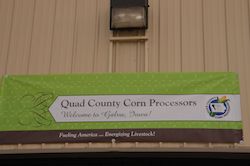Syngenta has reached an agreement with Cellulosic Ethanol Technologies, LLC, to license its Adding Cellulosic Ethanol technology, a new process for ethanol plants. Adding Cellulosic Ethanol technology has been shown to significantly increase a plant’s ethanol production while delivering other benefits such as increased corn oil production and higher protein content in dried distillers grains (DDGs).
 Cellulosic Ethanol Technologies, LLC, is a wholly owned subsidiary of Quad County Corn Processors (QCCP), and is currently being added to the QCCP ethanol plant in Galva, Iowa. The process is expected to go online in May 2014. Testing to date demonstrates the concept will run successfully at full commercial scale.
Cellulosic Ethanol Technologies, LLC, is a wholly owned subsidiary of Quad County Corn Processors (QCCP), and is currently being added to the QCCP ethanol plant in Galva, Iowa. The process is expected to go online in May 2014. Testing to date demonstrates the concept will run successfully at full commercial scale.
“We are continuously looking at new technologies that will contribute to the future success of the ethanol industry, and we are very excited about the opportunities that are emerging,” said David Witherspoon, head of renewable fuels for Syngenta. “We believe the new Adding Cellulosic Ethanol process will be a critical component in the development and commercialization of advanced and cellulosic ethanol.”
By converting corn kernel fiber into cellulosic ethanol in a bolt-on process, Adding Cellulosic Ethanol technology is designed to increase a plant’s ethanol production. In combination with the Enogen corn trait from Syngenta, Adding Cellulosic Ethanol technology allows the corn kernel fiber and starch to be converted into ethanol. Syngenta says Enogen trait technology is the only corn output trait designed specifically to enhance ethanol production.
“The integration of the Adding Cellulosic Ethanol process into the QCCP plant operation will help create a higher protein feed, 2.5 times more corn oil and more ethanol out of the same kernel of corn,” said Delayne Johnson, chief executive officer of QCCP. “This launch represents a major advance in the production of cellulosic ethanol.”
“The combination of Adding Cellulosic Ethanol and Enogen corn is expected to generate significant synergies when used together in dry grind ethanol plants,” Johnson added. “It will produce advanced and cellulosic ethanol while decreasing natural gas usage, increasing ethanol throughput and reducing an ethanol plant’s carbon footprint. These advantages, combined with increased corn oil production and high-protein DDGs, make the technology package appealing for ethanol plants looking to improve their bottom line.”

